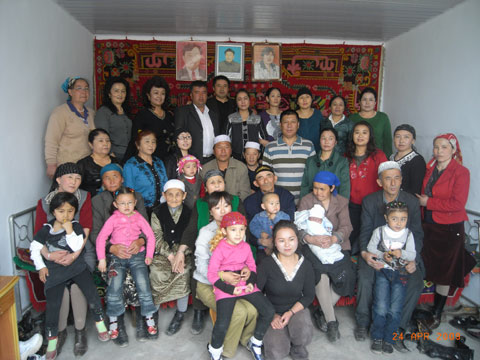 |
| Anipa Alimahong |
It’s not easy for Anipa Alimahong, the “remarkable mother of Xijiang Uygur autonomous region”, to convene her huge family together for a reunion photo. The family has more than 80 members from six different ethnic groups, namely Kazak, Hui, Han, Uygur, Tartar and Uzbek, making a group shot a difficult task indeed.
Among Anipa’s 19 offspring, she gave birth to nine children, while the other 10 were adopted between 1963 and 1994. Her grassroots level philanthropic contributions go far beyond ‘remarkable’; many say what she has done is a miracle. However, she becomes quite reserved when it comes to describing that miracle.
“I grew up in a tradition where everyone must help others; a caring heart is greatly valued in my family culture,” she said. “I have adopted 10 children up to now; I am happy to [adopt] more. My next wish is to adopt orphans from Wenchuan, where a devastating earthquake made [many] children homeless,” Anipa added.
Her story dates back to 1956, the time when her family abandoned their poor and struggling life in Mongolia. They came to Qinghe county in Xinjiang Altay, where there is a shared 280 kilometer border with Mongolia.
In contrast to the hardships her family endured in Mongolia, Anipa found that living in Xinjiang was much better, and people in Qinghe were kind and treated each other with mutual respect. In the first few years, Anipa’s neighbors and friends offered lots of support to help her settle and merge with the local community.
As she waded through the difficulties, Anipa felt a strong obligation to fulfill her own wish—paying back the county and its people with her own generosity and dedication.
 |
| Anipa's family |
In 1963, Anipa’s neighbor Yahfu died; his wife died shortly after. They had three children—the eldest was 19 and the youngest was only 14. Anipa and her husband Abibao helped the three children get by, but they were too young to live an independent life.
The couple wanted to take the children in, despite the adverse situation of their own family. The entire family was living on Anipa’s husband’s mere income of 47 yuan per month. “Our living was no better than Yahfu and his wife’s situation when they were alive. Food shortage and a lack of daily necessities were common in the 1960s,” Anipa recalled.
“Losing one’s parents causes a lot of grief, and I just wanted to help these kids step out of despair as soon as possible. It was more like a basic instinct as a mom. [I thought] they wouldn’t feel lonely if we lived together,” Anipa said. “I couldn’t see these three brothers starve to death,” she added.
Anipa, who was only 20-years old then, decided to look for a job and help lessen the burden on the family. “I still remember the image when my mom got up early and went to the street to sell yoghurt,” said Rahimam, the youngest daughter. “Mom was so small and she carried a huge white plastic bucket full of yoghurt. I can never forget that,” she added.
From her yoghurt business, Anipa could earn 36 yuan every month, but the family’s situation only merely improved. Their life on an extremely tight budget lasted for 14 years before getting worse.

